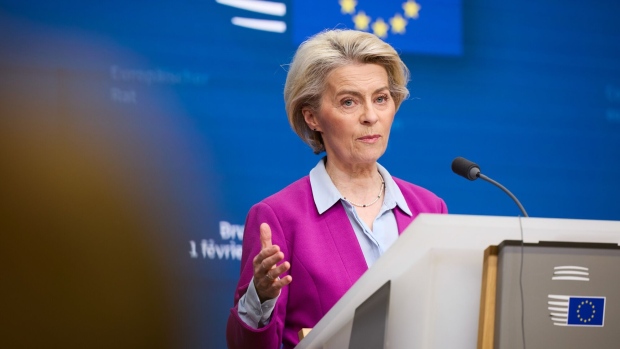Feb 1, 2024
EU’s Toughest ESG Rule Hits Stumbling Block on German Concerns
, Bloomberg News

(Bloomberg) -- The European Union’s most stringent ESG rule to date may be scuppered due to eleventh-hour German opposition to the plan.
The EU was on track to move forward with the Corporate Sustainability Due Diligence Directive after December, when lawmakers and representatives of member states ended months of negotiations with a provisional agreement. Under the directive, companies would face civil liability for failing to address environmental and human rights breaches in their value chains. It also mandates climate transition plans.
Germany has a similar national law and had been an important supporter of the EU legislation, designed in part to create an EU-wide accountability framework after more than 1,000 Bangladeshi workers making clothes for EU markets died in a 2013 building collapse.
But now Europe’s largest economy is likely to abstain from the final vote among member states, currently scheduled for Feb. 9, according to a person familiar with the matter. An abstention by Germany could prompt others to follow suit, eroding support for and potentially burying the legislation, especially with time running short before EU elections scheduled for June.
Belgium, which holds the EU’s rotating presidency, is still confident it can get a deal across the line, according to its spokesman.
The stumbling block emerged when Germany’s Free Democratic Party, part of the ruling coalition, unexpectedly announced its opposition to CSDDD in a Jan. 15 declaration, citing “bureaucratic hurdles” and “legal uncertainty.”
In a subsequent Feb. 1 letter, German Finance Minister Christian Lindner and Justice Minister Marco Buschmann, both members of FDP, said that while the provisional agreement met many of Germany’s demands, it continues to fall short and after intense discussions they concluded they couldn’t support the deal.
Abstaining from a vote is rare in the EU once a provisional agreement has been reached, though not unprecedented. Last year, last-minute objections to rules on phasing out combustion engines in cars and boosting renewables by Germany and France, respectively, threatened to kill those laws before assurances were made and compromises found.
The latest development comes amid waning voter support for the German government. A poll last month showed the co-ruling FDP trailing a new far-left group and at risk of dropping out of parliament, amid widespread frustration with German Chancellor Olaf Scholz’s ruling coalition. Farmers blocked highways last month to protest the end of a subsidy on diesel used for agriculture.
“Thanks to the FDP, the CSDDD has received a stop signal from Germany,” said Johannes Vogel, a member of Parliament and FDP’s deputy chairman, in an emailed comment on Thursday. “No company currently needs new bureaucratic burdens from Ursula von der Leyen,” the president of the EU Commission.
Meanwhile, Scholz has acknowledged that his three-party coalition was once again not united on an EU topic which had already been agreed.
“I have to admit that there is no consensus that the agreements we have reached in Europe are adequate,” Scholz told reporters in Brussels on Thursday. The German chancellor made clear that he was still in favor of the law proposal and that it would lead to better working condition world-wide, but that his coalition partner, the liberal FDP, was blocking it.
“Sometimes progress is a snail’s pace,” Scholz said.
Game-Changing Legislation
Civil society organizations that have lobbied for better accountability decried the turn of events, and warned the EU risks losing its lead on addressing pressing environmental and social issues if the directive fails.
“Germany shouldn’t put the CSDDD in danger because of its internal troubles,” said Isabella Ritter, EU policy officer for ShareAction. “It’s the game-changing legislation for how business is made in Europe.”
CSDDD is the latest in a series of EU initiatives to make the economy sustainable and meet its commitment to the Paris Agreement. But the new ESG framework has prompted complaints of excessive reporting requirements and data issues.
Whether there’s any room for compromise to get CSDDD adopted is unclear. Lawmakers already made major concessions to member states, including temporarily excluding the financial industry from the full scope of the directive.
Italy and Sweden may also decline to back the rule as it stands, according to people familiar. That would likely mean that the law doesn’t have enough support to be approved. Belgium could choose to delay the vote on CSDDD if it deems there is insufficient backing.
“The German abstention has also been driven by the interests of national business associations,” said Pietro Cesaro, policy adviser at climate think-tank E3G. “It would be regrettable for Italy – or any other country – to be influenced by these developments, particularly as the directive would have much less impact for Italy due to its import-export structure.”
--With assistance from Petra Sorge and Arne Delfs.
(Update to add reference to letter sent by German ministers)
©2024 Bloomberg L.P.







